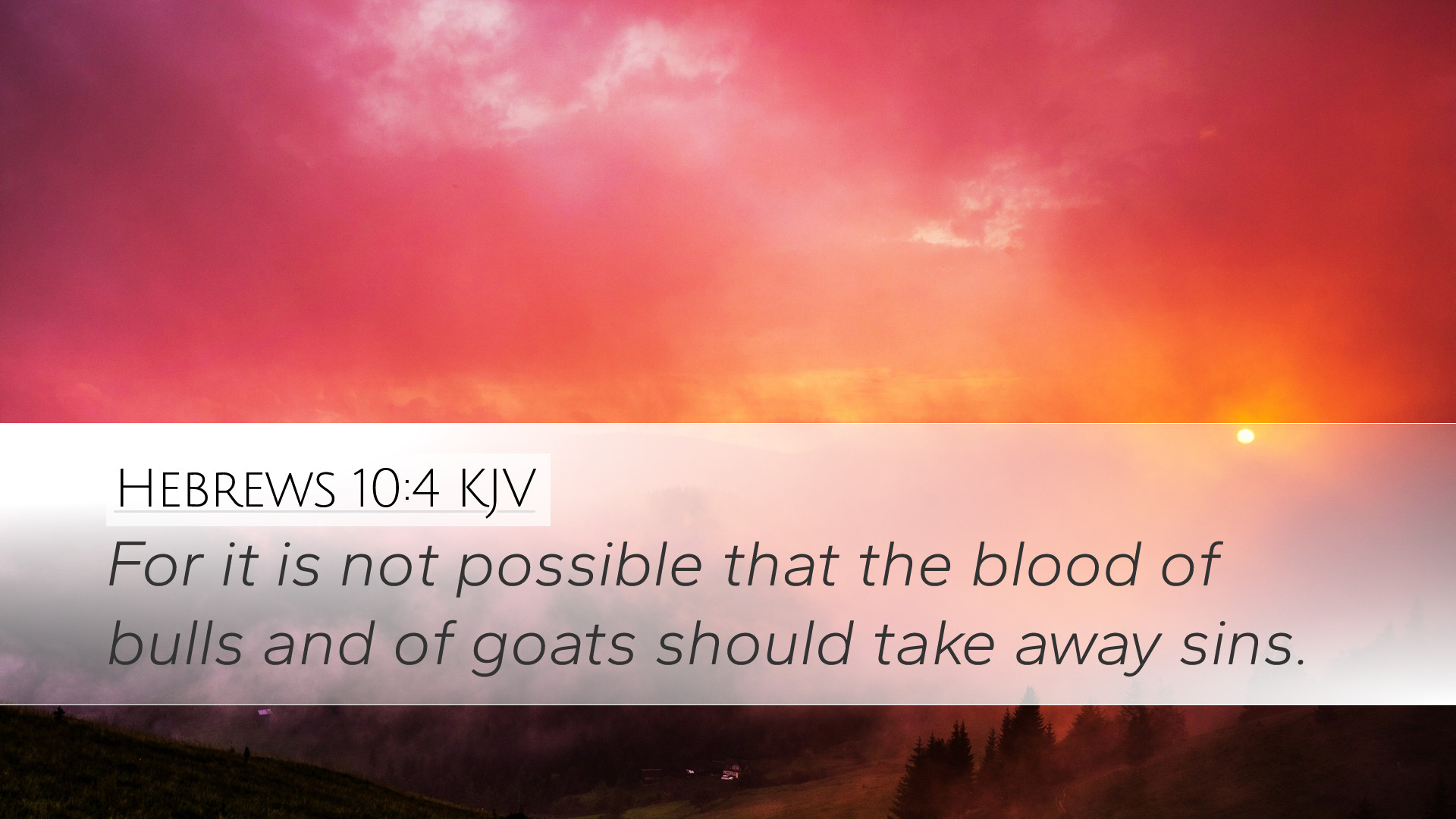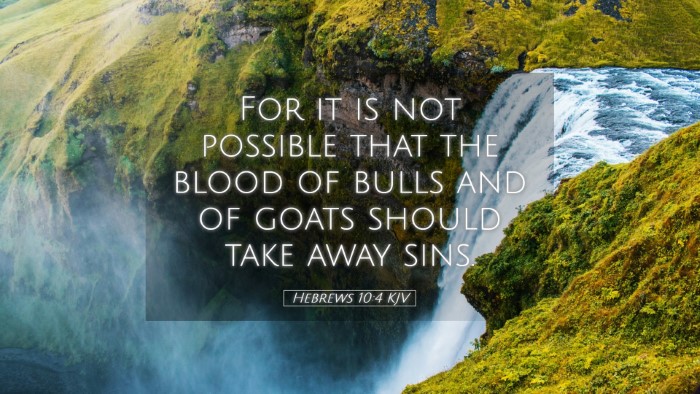Commentary on Hebrews 10:4
The verse Hebrews 10:4 states: "For it is not possible that the blood of bulls and of goats should take away sins." This powerful assertion presents the heart of the author’s argument regarding the insufficiency of Old Testament sacrifices for true atonement. In this commentary, we explore the profound theological implications as articulated by prominent public domain commentators such as Matthew Henry, Albert Barnes, and Adam Clarke.
Understanding the Context
To fully grasp the significance of Hebrews 10:4, it is essential to understand the context in which this statement is made. The book of Hebrews is addressed primarily to a Jewish audience that was transitioning from the Old Covenant, characterized by sacrificial systems, to the New Covenant established through Christ’s sacrificial death.
Matthew Henry's Insights
Matthew Henry emphasizes the inefficacy of animal sacrifices. He notes that while the law prescribed these offerings, their repeated nature highlighted their inability to achieve lasting forgiveness. Henry writes, "They could not take away sin; they could not deliver the soul from the guilt of sin, nor cleanse the conscience from dead works."
This inability stems from the fact that these sacrifices were merely symbols pointing to a greater reality, which is fulfilled in Christ.
Furthermore, Henry points out that the Old Testament sacrifices were a foreshadowing of the ultimate sacrifice that would come through Jesus. The countless offerings demonstrate man's persistent sinfulness, yet they also establish a longing for a true atonement, which can only be found in Christ.
Albert Barnes's Perspective
Albert Barnes elaborates on the theological implications of this verse. He stresses that the repetition of sacrifices year after year indicates their inherent weakness and inadequacy. Barnes explains: "The very fact that blood was shed so often must suggest that it was not sufficient to make a perfect atonement." This repetitiveness serves to highlight a profound truth: that true redemption must come from a singular, perfect sacrifice—namely, that of Christ.
Barnes also delves into the nature of sin, asserting that sin is a gravely serious matter that cannot be lightly addressed. The continual return to animal sacrifices signifies a profound need for something greater, something capable of fully reconciling humanity with God.
Adam Clarke's Commentary
Adam Clarke focuses on the legal and ceremonial aspects of sacrifices, distinguishing between the physical acts and their spiritual meanings. He notes: "The sacrifices of the law were intended to prefigure Christ... but they could never take away the guilt of sin." Clarke underscores that the sacrifices served as types and shadows, leading to the reality of Christ’s atonement.
Clarke also comments on God’s justice, stating that God’s nature requires a more profound satisfaction for sin than what the blood of animals can provide. He emphasizes the necessity of a perfect sacrifice—an offering of infinite worth, which is fulfilled in Jesus Christ.
The Implications of Hebrews 10:4
-
Replacement and Fulfillment:
The insufficiency of animal sacrifices leads to the understanding that Christ's sacrifice is the complete fulfillment of the sacrificial system, as hinted at by Henry, Barnes, and Clarke. It is not merely a continuation of the old; it is a transformation of the entire paradigm.
-
Call to a New Understanding of Atonement:
Pastors and theologians are encouraged to convey to their congregations the significance of Christ's sacrifice. The shift from animal sacrifices to Christ's blood should fortify believers’ understanding of grace and the profound nature of Christ’s atonement.
-
Assurance of Salvation:
This passage offers assurance to believers, underscoring that through Christ’s sacrifice, complete and total forgiveness is available, removing the constraints and cycles of old sacrificial systems.
-
Encouragement to Live in Light of the New Covenant:
The truth contained in Hebrews 10:4 encourages believers to embrace their identity within the New Covenant, prompting a life of gratitude and devotion to Christ who has handled the sin issue decisively.
Conclusion
Hebrews 10:4 serves as a pivotal verse in understanding the transition from the Old Covenant to the New Covenant. The insights from Matthew Henry, Albert Barnes, and Adam Clarke collectively emphasize the inadequacy of animal sacrifices and the necessity of Christ’s perfect sacrifice. As students of Scripture, pastors, and theologians delve into this passage, they are reminded of the depth of atonement and the transformative grace found solely in Jesus Christ.


